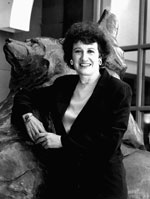Professor
Christina Maslach named new vice provost for undergraduate education
at UC Berkeley
06
Dec 2000
By
Marie Felde, Media Relations
Berkeley
- Christina Maslach, professor of psychology at the University
of California, Berkeley, and an internationally known expert
in the field of job burnout, has been appointed UC Berkeley's
vice provost for undergraduate education.
|


Christina
Maslach. Peg
Skorpinski photo |
The new
position in the campus's senior administration underscores
Chancellor Robert M. Berdahl's commitment to enhancing undergraduate
education at UC Berkeley. The appointment completes a restructuring
of the senior administration that was begun last summer by
Berdahl and is aimed at seizing opportunities in teaching,
technology and research.
"My goal
is to ensure that the Berkeley undergraduate education is
the best there is," said Maslach, who assumes her new post
on Jan. 1, 2001. UC Berkeley serves 22,700 undergraduates
studying in approximately 100 majors.
"We are
heading into a new century, and this is a time for change
and new visions, a time for asking questions about what we
do and what we could do," said Maslach. "At the same time,
technology is transforming our world, and we really have to
think about how we can unlock the potential out there."
The vice
provost for undergraduate education joins two other new vice
provosts - one for academic affairs and faculty welfare, the
other for academic planning and facilities. They report to
the campus's chief academic officer, Executive Vice Chancellor
and Provost Paul R. Gray.
"Christina
Maslach is an exceptional person with an outstanding track
record of achievement and contribution as a scholar, as an
innovator in undergraduate education, and in campus leadership,"
said Gray. "She will play a key role as the campus strives
to improve the undergraduate academic experience. We are indeed
fortunate to have her as part of the campus administration."
Maslach
said she will work to assure excellence in teaching and learning
across school, college and division boundaries and, working
with the faculty's Academic Senate, will promote curricular
reform and innovation.
She will
also oversee advances in educational technology and its implementation
on campus. "We want to make the most of new technology," said
Maslach, "but the question we have to ask is, 'In service
of what pedagogical goals? Is it so students learn better,
or because it provides flexibility, or what?' Our focus has
to be on the education of our students."
Maslach,
54, has been a member of the UC Berkeley faculty since 1971.
Ten years ago, she chaired the campus's Commission on Responses
to a Changing Student Body, which resulted in the "Maslach
Report." Its recommendations on ways to improve student success
have been largely implemented over the past decade.
Maslach
has been recognized as both an excellent teacher and a leader
in her academic field. In 1997, she was named "Professor of
the Year" by the Carnegie Foundation and the Council for the
Advancement and Support of Education. In her selection as
a Fellow of the American Association for the Advancement of
Science in 1991, she was cited for groundbreaking work on
the applications of social psychology to contemporary problems.
She is
best known as one of the pioneering researchers on job burnout
and is the author of the Maslach Burnout Inventory (MBI),
the most widely used research measure in the burnout field.
She also authored several books and an organizational assessment
program. She intends to continue her research while serving
in her new position.
Maslach
is currently chair of the Berkeley Division of the Academic
Senate for the University of California. She will step down
from the post at the end of the fall term. Academic and administrative
service to UC Berkeley runs in her family. Her father, George
Maslach, is the former dean of the College of Engineering
and served in several senior administrative positions, including
as a provost and a vice chancellor.
Maslach
lives in San Francisco with her husband, Philip Zimbardo,
a popular professor of psychology at Stanford University.
They have two daughters who are completing their university
educations in New York and California.
###
.
|